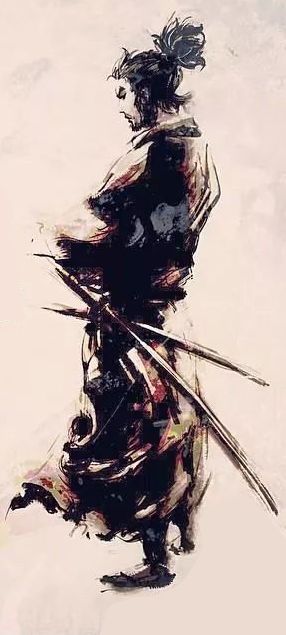
Miyamoto Musashi (unknown artist)
To be in favor or disgrace
is to live in fear.
To take the body seriously
is to admit one can suffer.
What does that mean,
to be in favor or disgrace
is to live in fear?
Favor debases:
we fear to lose it,
fear to win it,
So the be in favor or disgrace
is to live in fear.
What does that mean,
to take the body seriously
is to admit one can suffer?
I suffer because I’m a body;
if I weren’t a body,
how could I suffer?
So people who set their bodily good
before the public good
could be entrusted with the commonwealth,
and people who treated the body politic
as gently as their own body
would be worth to govern the commonwealth.

There are many ways one can interpret this. Lao Tzu is often concerned with the question of political power and from whence it comes; he appears to believe it is something that people will grant a leader, when that leader is obviously wise, gentle, and has their interests at heart. Power is not something to be acquired, it is a burden placed on one.
It is said in the days of the samurai that the best swordsmen, sensei, teachers, would never draw a sword to fight; Yamaoka Tesshu would occasionally lose his temper with a student and tell them to attack him, and he would then disarm them; he had no fear of suffering because an annoying student was as painful to him as a sword-cut. Yet he wouldn’t dream of hurting a student, because that would be the worst conceivable mistake. It’s funny to think that there are some people whose strength is so little, that they can be reduced to incoherent, foaming, rage by a casual comment. Of course there are such people, but nobody would make them leader of anything.
The painting of Musashi appeals to me because Musashi is portrayed in an unaggressive pose; thoughtful yet immovable. I love the way the artist has him sort of watching us out of the corner of his eye, but he’s relaxed; there’s no threat, just calm.
For those of you that just arrived, this is from Ursula LeGuin’s graceful and loving translation of Tao Te Ching [amazon] which is a recommended book.

I second the recommendation of Ursula Le Guin’s version. Over the years I’ve collected several translations of the Dao De Jing into English, Italian and French, and hers stands out to me for its readability and immediacy.
That’s some lovely brushwork, by the way.
Funny, I see that picture as representing tension, violence barely contained.
That is beautiful. Is it available as a print/poster anywhere?
Pierce R. Butler@#2:
I think both our interpretations are consistent with the painting.
Musashi is such an interesting character! Some of the stories about him make him sound like he probably was a sociopath, or suffered from extreme PTSD. Yet, he lived through it all and managed to find peace and a modicum of contentment – which is more than can be said about pretty much everyone who ever drew a blade against him.
sonofrojblake@#3:
I don’t know if this is the original artist or not (redbubble can be tricky like that) but:
https://www.redbubble.com/people/mihaistoicescu/works/12795196-samurai